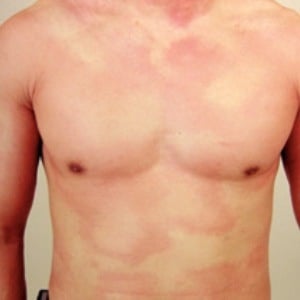
A new drug to treat chronic hives is producing solid results in clinical trials, and could be available to people suffering with the maddening itchy welts within a year or so, researchers say.
Ligelizumab works by targeting an immune system antibody called immunoglobulin E (IgE), which is responsible for the allergic reaction that causes hives, said lead researcher Dr Marcus Maurer. He is director of dermatology and allergy research at the Charite-University Medicine Berlin in Germany.
Common allergic reaction
"More than half of all patients treated with this drug have no more signs or symptoms," Maurer said. "Complete response."
Hives are a very common and normally temporary allergic reaction to a drug, food or substance, according to the US National Institutes of Health.
But one out of every 200 people will develop a case of chronic hives during their lifetime, the researchers said in background notes.
Chronic hives are cases that last for six weeks or more. Some people suffer for months and even years, said Dr David Center, chief of pulmonary, allergy and critical care medicine at Boston University Medical Campus.
"It's a benign disease, but these patients suffer. It is miserable to have hives every day," Center said. "Can you imagine itching all over, being unable to concentrate? It's an extremely unpleasant disease, but no one dies of hives."
Hives occur when IgE encounters a foreign substance and triggers an allergic response in the body, but the IgE antibodies of some people go into overdrive and start responding to even naturally occurring proteins in the body, Maurer said.
Ongoing clinical trials
Antihistamines are the front-line treatment for hives, according to Center, who wrote an editorial accompanying the new study. These medications are available over-the-counter and very cheap, with a year's supply costing $100 (±R1 500) or less.
Ligelizumab is the second member of a drug family that constitutes the second-line therapy for chronic hives, Center said. These drugs bind with the IgE antibodies and prevent them from causing an allergic reaction.
The first drug in the family, omalizumab (Xolair), has been around since the early 2000s, Center said. It costs up to $30 000 (R±455 000) a year, and requires monthly injections at a doctor's office.
Clinical trials comparing ligelizumab and omalizumab are ongoing, Maurer noted.
The most recent clinical trial showed that 51% of patients treated with a 72mg dose of ligelizumab wound up with complete relief from their hives within three months, compared with 26% of patients treated with omalizumab, according to findings published in the New England Journal of Medicine.
"This new anti-IgE agent has a much higher affinity to the IgE," Maurer said. "It finds the IgE much better and neutralises it better."
The drug's developer, Novartis Pharma, paid for the clinical trial.
Chronic hives tend to remit
Phase three trials of ligelizumab currently are underway, and Maurer expects to submit the drug for US Food and Drug Administration approval within a year or so.
One benefit of the newer drug could be that it would require fewer injections, Center said. The new clinical trial showed that most patients could go longer between shots.
"It might bind more tightly to the IgE, and you might be able to get a shot once every six weeks as opposed to once every four weeks," Center said.
The downside is the new drug is very likely to be at least as expensive as omalizumab, Center said.
"That's the bad news. The good news is that chronic hives tend to remit," Center said. "They're bad for a couple of months, couple of years, and then slowly go away. So you wouldn't have to use the drug for life."
People suffering with chronic hives should ask their doctor about these IgE-blocking drugs, Maurer concluded.
"There's no reason to stay home or to be OK with a treatment that doesn't work," Maurer said. "This is a devastating and debilitating, long-lasting disease. People should call on us for these treatments, and don't give up."
Image credit: iStock




 Publications
Publications
 Partners
Partners











